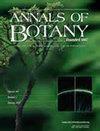Inferring complex evolutionary history of the closely related East Asian wild roses in Rosa sect. Synstylae (Rosaceae) based on genomic evidence from conserved orthologs
IF 3.6
2区 生物学
Q1 PLANT SCIENCES
引用次数: 0
Abstract
Background and Aims The section Synstylae in genus Rosa (Rosaceae) comprises 25–36 species and includes several major progenitors of modern rose cultivars. East Asian Synstylae species have recently diverged and are closely related, and their phylogenetic relationships remain unclear. In the present study, we employed a conserved ortholog set (COS) markers and genome-wide nuclear orthologs to elucidate their phylogenetic relationships and unravel their complex evolutionary history. Methods Utilising on eight Rosaceae COS (RosCOS) markers, we analysed a total of 137 accessions representing 15 East Asian Synstylae taxa to establish a robust phylogenetic framework and reconstruct ancestral areas. Furthermore, we constructed the species tree for eight representative species and estimated their divergence times based on 1,683 genome-wide orthologs. The species tree-gene tree coalescence time comparison, Patterson’s D, f4-ratio, and f-branch statistics were analysed to identify incomplete lineage sorting (ILS), genetic introgression, and reticulation events using conserved ortholog data. Key Results RosCOS markers and genome-wide orthologs effectively resolved the robust phylogeny of East Asian Rosa sect. Synstylae. Species divergence times estimated with genome-wide orthologs indicated that East Asian Synstylae species have recently diverged, with an estimated crown age of approximately 2 Mya. The rampant gene tree discordance indicated the possibility of ILS and/or genetic introgression. In the section Synstylae, deeper coalescence in the gene trees compared to the species tree suggested ILS as a source of gene tree discordance. Further, Patterson’s D and f-branch statistics indicated that several lineages in the section were involved in genetic introgression. Conclusions We have unravelled the complex evolutionary history of East Asian Rosa sect. Synstylae, including recent species divergences, ILS, and genetic introgression. Coupled with the geographical and ecological complexity of East Asia, ILS and genetic introgression may have contributed to the rapid diversification of East Asian Synstylae species by permitting adaptation to diverse environments.根据基因组证据推断蔷薇科(Rosa sect.基于基因组证据从保守的直向同源物推断东亚野玫瑰的复杂进化史
背景与目的 蔷薇属(Rosaceae)中的蔷薇科(Synstylae)包括 25-36 个物种,其中有几个现代蔷薇栽培品种的主要祖先。东亚的蔷薇属(Synstylae)物种最近才出现分化,且亲缘关系密切,其系统发育关系尚不清楚。在本研究中,我们利用保守正源集(COS)标记和全基因组核正源来阐明它们的系统发育关系,并揭示其复杂的进化历史。方法 我们利用 8 个蔷薇科 COS(RosCOS)标记,分析了代表 15 个东亚 Synstylae 类群的共 137 个登录品系,建立了一个稳健的系统发生框架,并重建了祖先区域。此外,我们还构建了 8 个代表性物种的物种树,并根据 1,683 个全基因组直向同源物估算了它们的分化时间。通过分析物种树-基因树的聚合时间比较、Patterson's D、f4-ratio和f-分支统计量,利用保守的直向同源物数据识别不完全世系分选(ILS)、基因导入和网状结构事件。主要结果 RosCOS 标记和全基因组直向同源物有效地解析了东亚蔷薇科的稳健系统发育。Synstylae。利用全基因组直向同源物估计的物种分化时间表明,东亚蔷薇属物种的分化时间较短,估计冠龄约为 2 Mya。猖獗的基因树不一致性表明了ILS和/或基因导入的可能性。在 Synstylae 部分,与物种树相比,基因树的凝聚程度更深,这表明 ILS 是基因树不一致的一个原因。此外,Patterson 的 D 和 f 分支统计表明,该部分的几个品系参与了基因导入。结论 我们已经揭示了东亚蔷薇科复杂的进化历史,包括最近的物种变迁。的复杂进化历史,包括最近的物种分化、ILS 和基因导入。再加上东亚复杂的地理和生态环境,ILS和基因导入可能是东亚蔷薇科物种迅速多样化的原因,因为它们能够适应不同的环境。
本文章由计算机程序翻译,如有差异,请以英文原文为准。
求助全文
约1分钟内获得全文
求助全文
来源期刊

Annals of botany
生物-植物科学
CiteScore
7.90
自引率
4.80%
发文量
138
审稿时长
3 months
期刊介绍:
Annals of Botany is an international plant science journal publishing novel and rigorous research in all areas of plant science. It is published monthly in both electronic and printed forms with at least two extra issues each year that focus on a particular theme in plant biology. The Journal is managed by the Annals of Botany Company, a not-for-profit educational charity established to promote plant science worldwide.
The Journal publishes original research papers, invited and submitted review articles, ''Research in Context'' expanding on original work, ''Botanical Briefings'' as short overviews of important topics, and ''Viewpoints'' giving opinions. All papers in each issue are summarized briefly in Content Snapshots , there are topical news items in the Plant Cuttings section and Book Reviews . A rigorous review process ensures that readers are exposed to genuine and novel advances across a wide spectrum of botanical knowledge. All papers aim to advance knowledge and make a difference to our understanding of plant science.
 求助内容:
求助内容: 应助结果提醒方式:
应助结果提醒方式:


